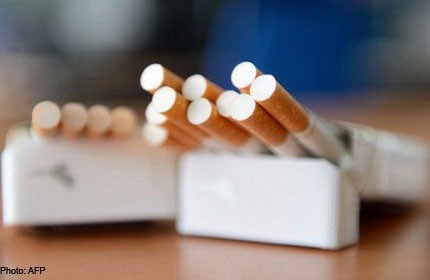Cigarettes and the terrorist link

The next time you light up a contraband cigarette, you may be funding organised crime syndicates or, worse, terrorist organisations.
Investigators have revealed to the New Straits Times that regional terrorist organisation such as Abu Sayyaf and Jemaah Islamiyah could be getting funding from local organised crime gangs.
The Home Ministry and crime prevention groups have begun drawing links to these organisations and the thriving illicit cigarette business that last year alone cost the government in excess of RM2 billion in lost taxes.
"There is a chance that these terrorist organisations, including global terror groups such as al-Qaeda, are using local organised crime gangs to help them finance their operations.
"It's also possible that they are using Malaysia as a base to fund their activities," said Home Minister Datuk Seri Dr Ahmad Zahid Hamidi. Crime analyst Kamal Affendi Hashim said illicit tobacco trafficking was the most attractive option for cartels to fund their illegal activities. "Looking at the billions lost by the government in revenue and the number of smuggled contraband cigarettes, one has to conclude that this is beyond the capacity of a single individual.
"The bigger organisations are involved simply because they need more money to fund their operations. "You need an international network," Kamal Affendi said, suggesting that cross-cells collaboration may be at work. Kamal Affendi added that some gangs would "expose" a less profitable vice activity on purpose to law enforcement officers to keep them "busy" while they focus on the main activity, which is cigarette smuggling.
"It's a parallel activity. It's a case of sacrificing the weaker baby so that attention is diverted from the main activity. "The members have the necessary network, connections and the know-how to move large shipments right under the noses of the authorities. Despite the enforcement coming down hard on the individuals involved, cartels couldn't be bothered as the penalty is almost laughable, compared with the amount of money they can make from this."
He said that crime syndicates and terrorist organisations were increasingly looking at this revenue stream to fund their activities because of the "low risk-huge profits" nature of the business.
Another criminologist cited the Lahad Datu intrusion as an example of how poor enforcement to arrest illicit cigarette smuggling had allowed the market in the east coast of Sabah to thrive.
"In that part of the country, illicit cigarettes have cornered more than 90 per cent of the market. "The minute the Eastern Sabah Security Command was set up and sea patrols increased, you can hardly find any contraband cigarettes coming in from the Philippines."
Illicit cigarettes (white and kretek) are those on which import duties have not been paid. "This means that they are available in the market at a considerably lower price. A pack of regular cigarettes costs RM10.50, while contraband packs cost anywhere from RM2.20 to RM4.
"Cigarettes are less 'ominous' by their very nature, as opposed to opium or cocaine, for example. You smoke cigarettes out in the open and they don't come under the same scrutiny as controlled substances would, which makes them easier to move around," said an investigator who specialises in the operations of these syndicates.
The business is so lucrative that organised crime gangs are collaborating to form cartels to manipulate, control and monopolise the sales of illicit tobacco.
Their networking is far-reaching and extends beyond physical, cultural and ideological boundaries, said another insider. Universiti Sains Malaysia's Professor Dr P. Sundramoorthy said there were tell-tale signs that local gangs were behind the illicit tobacco business.
"It is not surprising as these criminals have been taking advantage of the free trade zones and duty free zones to conduct their business," said the criminologist.